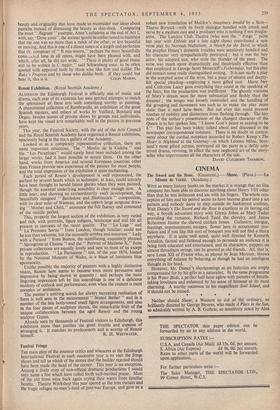Festival Fringe THE main ploy of the amateur critics and
wiseacres at the Edinburgh International Festival in each successive year is to visit the fringe shows and tell us which of the stones that the builder rejected should have been made the head of the corner. This year is no exception. Among a lively crop of non-official dramatic productions I would only name a few which have called forth well-merited praise. Most of the old firms were back again crying their wares from familiar booths. Theatre Workshop this year spared us the iron curtain and the tragic refugee no-man's-land of post-war Europe, and gave us a robust new translation of Moliere's Imaginary Invalid by a Scot— Thurso Berwick—with its lively dialogue handled with attack and verve by a medium cast and a producer who is nothing if not imagin- ative. The London Club Theatre (who won the " fringe " palm last year with Ebbtide and a late night show) contributed a new verse play by Norman Nicholson, A Match for the Devil, in which the prophet Hosea 's domestic troubles were sensitively handled and his character very sympathetically portrayed ; but it was the boy actor, his adopted son, who stole the thunder of the piece. The verse was much more dramatically and theatrically effective than that employed in George Scott Moncrieff's Fotheringay, but this play did contain some really distinguished writing. It is not really a play in the accepted sense of the term, but a piece of sincere and deeply- felt special pleading—employing a most gifted cast. Marie Ney and Catherine Lacey gave everything they could in the speaking of the lines, but the production was indifferent. The ghostly visitants of Mary's dream were far more substantial and fleshly than the dreamer ; the tempo was loosely controlled and the handling of the grouping and movement was such as to make the play more static than it need have been. But not even this could prevent touches of nobility and distinction from flashing through. The key note of the author's presentation of the changed character of the Queen is in her spoken line, "I know God's peace in ceasing to be I." This play has been widely talked about and discussed in the newspaper correspondence columns. There is no doubt or contro- versy about the cordial reception accorded to Robert Kemp's The Heart is Highland at the Gateway—in which Lennox Milne, Scot- land's most gifted actress, portrayed all the parts in a deftly con- trived drama, reviving, in effect the now neglected art of the story- teller who impersonates all the characters of the tale.
DAVID CLEGHORN THOMSON.


































 Previous page
Previous page